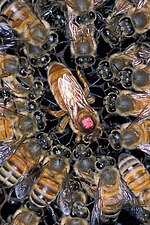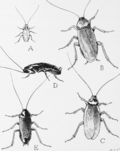Insect winter ecology describes the overwinter survival strategies of insects, which are in many respects more similar to those of plants than to many...
32 KB (3,916 words) - 13:56, 31 October 2024
the head. Another freeze-tolerant beetle is Upis ceramboides. See insect winter ecology and antifreeze protein. Another invertebrate that is briefly tolerant...
26 KB (3,008 words) - 09:28, 17 July 2024
Insect migration is the seasonal movement of insects, particularly those by species of dragonflies, beetles, butterflies and moths. The distance can vary...
17 KB (1,987 words) - 02:46, 21 December 2023
Phasmatodea (redirect from Stick insect)
(2009). Insect Behavior. Springer Science & Business Media. pp. 187–189. ISBN 978-90-481-2389-6. Bedford, Geoffrey O. (1978). "Biology and Ecology of the...
52 KB (6,005 words) - 20:33, 25 October 2024
evaluating insect population dynamics. It is one of very few lepidopterans of temperate regions in which adults are active in late autumn and early winter. The...
18 KB (2,016 words) - 06:31, 30 December 2023
ISBN 978-0-313-38426-4. "Scale insects". Gardeners' World. Retrieved 16 January 2020. ScaleNet Nair, K. S. S. (2007). Tropical Forest Insect Pests: Ecology, Impact, and...
46 KB (4,753 words) - 02:49, 11 October 2024
form of migration in ecology. It is found in all major animal groups, including birds, mammals, fish, reptiles, amphibians, insects, and crustaceans. The...
12 KB (1,278 words) - 14:57, 17 May 2024
with estimates of the rate of climate change in general. Insect ecology Population ecology Pesticide resistance Insecticide Pest control Meyer, John...
21 KB (2,581 words) - 00:35, 22 May 2024
Coccinellidae (category Insects used as insect pest control agents)
food source. Like most insects, they develop from larva to pupa to adult. Temperate species hibernate and diapause during the winter; tropical species are...
54 KB (5,555 words) - 22:05, 29 October 2024
Euonymus europaeus (section Habitat and ecology)
europaeus is the almost exclusive winter host of the black bean aphid. Because of the potential economic loss from this insect that feeds on cultivated broad...
9 KB (935 words) - 07:59, 28 October 2024
Honey bee (redirect from Apis (insect))
A honey bee (also spelled honeybee) is a eusocial flying insect within the genus Apis of the bee clade, all native to mainland Afro-Eurasia. After bees...
100 KB (11,756 words) - 03:19, 29 October 2024
Generalist and specialist species (redirect from Generalist (ecology))
Retrieved 2024-06-14. Langellotto, Gail (2021-07-28). "Insect specialists". Garden Ecology Lab. Retrieved 2024-06-14. "What is the role of native bees...
7 KB (848 words) - 04:39, 19 June 2024
Lake ecosystem (redirect from Pond ecology)
competition. Sommer et al. described these patterns as part of the Plankton Ecology Group (PEG) model, with 24 statements constructed from the analysis of...
41 KB (5,307 words) - 08:38, 18 June 2024
Structure, Function, Behavior, and Ecology". In Conner, William E. (ed.). Tiger Moths and Woolly Bears: Behavior, Ecology, and Evolution of the Arctiidae...
11 KB (1,120 words) - 23:38, 4 October 2024
River ecosystem (redirect from Stream ecology)
1146/annurev.ento.43.1.271. PMID 15012391. Ward, J. V. 1992. Aquatic Insect Ecology: biology and habitat. Wiley, New York. P. 456. Watson, D. J.; Balon...
84 KB (9,930 words) - 06:34, 19 May 2024
Wētā (redirect from Weta (insect))
(also spelled weta in English) is the common name for a group of about 100 insect species in the families Anostostomatidae and Rhaphidophoridae endemic to...
31 KB (3,406 words) - 04:58, 16 October 2024
Gyne (redirect from Queen (insect))
Greek γυνή, "woman") is the primary reproductive female caste of social insects (especially ants, wasps, and bees of order Hymenoptera, as well as termites)...
5 KB (621 words) - 21:15, 30 March 2024
Boxelder bug (category Household pest insects)
suitable structures. The eastern boxelder bug is sometimes confused with insects belonging to the genera Jadera, Pyrrhocoris, and Melacoryphus. They may...
9 KB (1,026 words) - 21:43, 27 October 2024
Western honey bee (redirect from Utah state insect)
Retrieved 2016-02-08. Crane E (1990). "Honey from honeybees and other insects". Ethology Ecology & Evolution. 3 (sup1): 100–105. doi:10.1080/03949370.1991.10721919...
96 KB (11,421 words) - 11:37, 1 November 2024
Goldenrod gall fly (category Insects described in 1855)
to as a gall. E. solidaginis’s interactions with its host plant(s) and insect, as well as avian, predators have made it the centerpiece of much ecological...
17 KB (1,868 words) - 20:57, 8 May 2024
with plants. During the winter, this species consumes less insects than they do during the summer due to a decrease in the insect population. The round-eared...
6 KB (596 words) - 06:02, 1 March 2024
Termite (redirect from Isoptera-Behavior and Ecology)
Tropical Insect Science. 9 (1): 37–39. doi:10.1017/S1742758400009991. S2CID 84743428. Traniello, J.F.A.; Leuthold, R.H. (2000). Behavior and Ecology of Foraging...
186 KB (20,251 words) - 18:55, 27 October 2024
Mosquito (redirect from Nipper (insect))
breeds in the pitchers of pitcher plants, its larvae feeding on decaying insects that have drowned there. Oviposition, egg-laying, varies between species...
93 KB (9,237 words) - 14:56, 10 October 2024
are important to cave ecology, because they commonly feed outside and import material that serves as food when they return. Insect species such as some...
14 KB (1,591 words) - 03:05, 23 July 2024
Hornet (category Insects used as insect pest control agents)
Hornets (insects in the genus Vespa) are the largest of the eusocial wasps, and are similar in appearance to yellowjackets, their close relatives. Some...
26 KB (3,005 words) - 15:38, 24 October 2024
and voltinism in a polyphagous insect herbivore. Ecology 78: 977-986. [5] Timothy Duane Schowalter (2011). Insect Ecology: An Ecosystem Approach. Academic...
7 KB (933 words) - 03:31, 5 February 2023
Cockroach (redirect from Roach (insect))
Cockroaches: Ecology, Behavior, and Natural History. JHU Press. pp. 55–58. ISBN 978-0-8018-8616-4. Costa, James T. (2006). The Other Insect Societies. Harvard...
80 KB (8,396 words) - 19:49, 27 October 2024
Vespula germanica (category Insects described in 1793)
abundant honeydew produced by the beech-scale insect there. This has a serious effect on forest ecology, as less honeydew remains available for native...
22 KB (2,658 words) - 20:39, 10 October 2024
Ant (category Insects in culture)
(1992). "Capitula on stick insect eggs and elaiosomes on seeds: convergent adaptations for burial by ants". Functional Ecology. 6 (6): 642–648. Bibcode:1992FuEco...
154 KB (17,240 words) - 02:16, 31 October 2024
Herbivore (category Ecology terminology)
plant palatability increases with elevation as insect herbivore abundance declines". Journal of Ecology. 105 (1): 142–151. doi:10.1111/1365-2745.12664...
55 KB (6,355 words) - 14:00, 31 October 2024


























